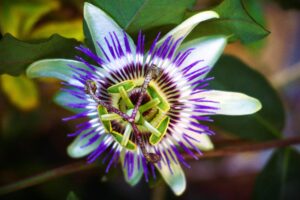
Introduction:
In a world that never sleeps, Insomnia has become an increasingly common affliction affecting millions of people globally. The constant stress, hectic lifestyles, and digital overload can take a toll on our sleep patterns, leading to a range of health issues. While there are various conventional treatments available, an alternative approach gaining popularity is homeopathy. In this blog, we’ll explore eight powerful ways in which homeopathy can be used to alleviate insomnia and promote restful sleep.
1. Aconitum Napellus (Aconite):
Aconitum Napellus, commonly known as Aconite, is a homeopathic remedy derived from the plant Aconitum napellus, also known as monkshood or wolfsbane. In homeopathy, Aconite is often recommended for various conditions, including Insomnia.
Here are some reasons why Aconitum Napellus is considered effective in addressing insomnia through homeopathy:
- Sudden Onset of Symptoms: Aconite is often indicated when Insomnia is triggered by sudden shock, fear, or intense emotions. Individuals who have difficulty calming their minds after a sudden event may find relief from Aconite. This remedy is believed to help restore balance to the nervous system, allowing the person to relax and sleep more soundly.
- Restlessness and Anxiety: Individuals who experience restlessness, anxiety, and a racing mind may benefit from Aconite. The remedy is thought to address the mental and emotional components contributing to insomnia, helping the person achieve a more tranquil state conducive to sleep.
- Fear and Apprehension: Aconitum Napellus is often recommended for those who exhibit fear or anxiety, especially if the insomnia is associated with a fear of the dark or fear of death. By addressing these underlying fears, Aconite is believed to promote a sense of security, making it easier for individuals to fall asleep.
- Overstimulation of the Nervous System: Aconite is considered when there is overstimulation of the nervous system, which may be exacerbated by external factors such as excessive noise, bright lights, or environmental stressors. By calming the nervous system, Aconite aims to reduce the hyperarousal that interferes with the ability to relax and sleep.
- Individualization in Homeopathy: Homeopathy emphasizes the concept of individualization, where a remedy is selected based on the unique symptoms and characteristics of the individual. Aconitum Napellus is chosen when the person’s symptoms match the specific indications for this remedy. This tailored approach is a fundamental aspect of homeopathic practice.
It’s important to note that the effectiveness of Aconitum Napellus, like any homeopathic remedy, may vary from person to person. Homeopathic treatments are based on the principle of “vital force” and the stimulation of the body’s self-healing mechanisms. As with any health concern, it’s advisable to consult with a qualified homeopathic practitioner who can assess your individual case, consider your complete symptom picture, and prescribe the most appropriate remedy and dosage. Additionally, it’s essential to approach insomnia holistically, considering lifestyle factors, sleep hygiene, and overall well-being.
2. Coffea Cruda (Coffee Cruda):
Coffea Cruda, derived from unroasted coffee beans, is a well-known homeopathic remedy that is often used to address Insomnia. While the exact mechanisms behind the effectiveness of homeopathic remedies are not fully understood, proponents believe that Coffea Cruda can be beneficial for certain types of insomnia due to its unique properties. Here are some reasons why Coffea Cruda is considered effective in homeopathy for addressing insomnia:
- Opposite Principle (Law of Similars): Homeopathy follows the principle of “like cures like,” meaning a substance that can cause symptoms in a healthy person can be used to treat similar symptoms in a sick person. Since coffee is known to cause symptoms such as mental hyperactivity, restlessness, and insomnia when consumed in excess, Coffea Cruda is believed to be effective for individuals experiencing similar symptoms of insomnia.
- Hyperactivity and Mental Stimulation: Coffea Cruda is often recommended for individuals who have overstimulated minds, with thoughts racing and an inability to calm down. These symptoms may be exacerbated by the consumption of coffee or caffeine-containing substances. The remedy is thought to counteract the effects of mental hyperactivity, making it easier for the individual to relax and fall asleep.
- Nervous System Regulation: It is believed that Coffea Cruda has an impact on the nervous system, helping to regulate and balance its activity. By calming the nervous system, the remedy aims to reduce the heightened mental states that can contribute to insomnia.
- Emotional and Mental Symptoms: Beyond physical symptoms, Coffea Cruda is also indicated for emotional and mental symptoms associated with insomnia, such as anxiety, excitement, or overexcitability. It aims to address the underlying emotional state that may be contributing to sleep disturbances.
- Individualized Treatment: Homeopathy is a highly individualized form of medicine. Coffea Cruda is not a one-size-fits-all remedy for insomnia. It is selected based on a person’s unique combination of symptoms, including mental, emotional, and physical aspects. A homeopathic practitioner will consider the totality of symptoms before prescribing this remedy.
It’s important to note that while some individuals may experience positive results with Coffea Cruda, not everyone will respond to the remedy in the same way. Additionally, the effectiveness of homeopathic remedies, including Coffea Cruda, is a subject of ongoing debate within the medical community. As with any health concern, it’s advisable to consult with a qualified healthcare professional, preferably one with expertise in homeopathy, to determine the most appropriate treatment plan for your specific situation.
3. Nux Vomica:
Nux Vomica is a homeopathic remedy derived from the seeds of the Strychnos nux-vomica tree, native to India and Southeast Asia. It has a long history of use in homeopathy and is considered effective for various conditions, including Insomnia, when matched with the specific symptoms of the individual.
Here are some reasons why Nux Vomica is believed to be effective in addressing insomnia through homeopathy:
- Stress and Overwork: Nux Vomica is often recommended for individuals who lead a high-stress, fast-paced lifestyle and experience insomnia as a result. The remedy is thought to be particularly beneficial when insomnia is linked to mental overactivity, constant thinking, and the inability to unwind after a hectic day.
- Sedative Properties: In homeopathic philosophy, Nux Vomica is associated with sedative properties. It is believed to have a calming effect on the nervous system, helping to soothe restlessness and promote relaxation. This can be especially helpful for those who struggle to quiet their minds and find it challenging to transition from a state of alertness to a more relaxed state conducive to sleep.
- Digestive Disturbances: Nux Vomica is also known for its affinity for the digestive system. When insomnia is accompanied by digestive issues such as indigestion, acidity, or discomfort after eating, this remedy may be considered. By addressing both the mental and physical aspects of the person’s condition, Nux Vomica aims to restore balance and promote overall well-being.
- Sensitivity to Stimulants: Individuals who are sensitive to stimulants like coffee, alcohol, or spicy foods may find relief with Nux Vomica. If these substances contribute to the inability to fall asleep or result in disturbed sleep, this remedy is thought to help rebalance the system and reduce sensitivity.
- Cold and Irritability: Nux Vomica is often recommended for individuals who are irritable, easily angered, and may experience heightened irritability when dealing with insomnia. The remedy is also associated with a sensation of feeling cold, both mentally and physically.
It’s important to note that homeopathy treats individuals based on their unique symptoms, considering the totality of physical, mental, and emotional aspects. Nux Vomica may be effective for one person with specific symptoms but might not be the ideal choice for another person with a different set of symptoms.
As with any homeopathic remedy, it is advisable to consult with a qualified homeopathic practitioner to ensure that Nux Vomica is the most suitable choice for the individual’s specific case. Homeopathic treatment is highly individualized, and the selection of remedies is based on a thorough understanding of the person’s overall health and symptoms.
4. Passiflora Incarnata (Passionflower):
Passiflora Incarnata, commonly known as Passionflower, is a plant that has been used traditionally for its calming and sedative properties. In homeopathy, Passionflower is considered an effective remedy for addressing Insomnia and sleep-related issues. Several factors contribute to its perceived effectiveness in treating insomnia through homeopathy:
- Calming Properties: Passionflower is known for its calming and soothing properties. In homeopathy, it is believed to have a regulatory effect on the nervous system, helping to calm hyperactivity and reduce restlessness. This makes it particularly useful for individuals who struggle with a busy mind when trying to fall asleep.
- Anxiolytic Effects: Anxiety is a common contributor to insomnia, and Passionflower is thought to possess anxiolytic (anxiety-reducing) effects. By helping to alleviate feelings of nervousness and anxiety, this homeopathic remedy may contribute to creating a more conducive environment for sleep.
- Balancing Neurotransmitters: Some research suggests that Passionflower may influence the levels of neurotransmitters in the brain, such as gamma-aminobutyric acid (GABA). GABA is an inhibitory neurotransmitter that has a calming effect on the central nervous system. By promoting GABA activity, Passionflower may contribute to relaxation and improved sleep.
- Restoring Sleep Patterns: Insomnia often disrupts normal sleep patterns. Passionflower is believed to help regulate sleep cycles and restore a more natural and restful sleep pattern. This can be especially beneficial for individuals experiencing difficulty staying asleep throughout the night.
- Minimal Side Effects: Homeopathic remedies are known for their gentle nature and minimal side effects when used appropriately. Passionflower, when administered in accordance with homeopathic principles, is generally well-tolerated. This makes it an attractive option for individuals seeking a natural and non-habit-forming solution to insomnia.
5. Ignatia Amara:
Ignatia amara, commonly known as Ignatia, is a homeopathic remedy derived from the seeds of the St. Ignatius bean, which is native to the Philippines. It is often prescribed in homeopathy for a variety of emotional and mental health issues, including Insomnia. Here are some reasons why Ignatia amara is considered an effective remedy for insomnia:
- Emotional Stress and Grief: Ignatia is particularly well-suited for individuals who are experiencing insomnia due to emotional stress, grief, or disappointment. It is known for its efficacy in addressing emotional disturbances, and it may help individuals who find it difficult to cope with the emotional challenges that are affecting their sleep.
- Mind-Body Connection: Homeopathy operates on the principle that physical symptoms are closely connected to the individual’s mental and emotional state. Ignatia is often indicated when there is a strong mind-body connection, and emotional distress is manifesting as sleep disturbances.
- Variability of Symptoms: Individuals who benefit from Ignatia may exhibit varying symptoms. They may experience mood swings, weepiness, and sudden changes in emotional states. This variability of symptoms aligns with the principles of homeopathy, where the remedy is chosen based on the unique and specific symptoms of the individual.
- Frequent Waking During the Night: Ignatia is often recommended for those who wake up frequently during the night, often as a result of emotional stress or grief. The remedy aims to address the underlying emotional issues, helping the person achieve a more restful and continuous sleep.
- Restoring Emotional Balance: By focusing on emotional balance and well-being, Ignatia is believed to have a calming effect on the nervous system. This may help individuals relax both mentally and physically, making it easier for them to fall asleep and stay asleep.
- Holistic Approach: Homeopathy as a system of medicine emphasizes a holistic approach to healing, taking into account the individual’s overall well-being rather than just targeting specific symptoms. Ignatia aligns with this holistic philosophy by addressing the emotional and mental aspects that contribute to insomnia.
It’s important to note that the effectiveness of Ignatia, like any homeopathic remedy, is highly individualized. Homeopathy considers the totality of symptoms, including emotional and mental states, to determine the most suitable remedy for a particular person. As with any health concern, individuals should consult with a qualified homeopathic practitioner or healthcare professional for personalized advice and treatment. Additionally, combining homeopathic remedies with lifestyle changes and good sleep hygiene practices can enhance the overall effectiveness of the treatment for insomnia.
6. Arsenicum Album :
Arsenicum album, commonly known as Arsenic, is a homeopathic remedy that is believed to be effective for certain types of insomnia based on the principles of homeopathy. Homeopathy operates on the concept of “like cures like” and individualized treatment. Arsenicum album is derived from arsenic trioxide and is diluted to a very high degree, following the principles of potentization in homeopathy.
Here are some reasons why Arsenicum album is considered effective in treating insomnia:
- Restlessness and Anxiety: Arsenicum album is often recommended for individuals who experience insomnia accompanied by restlessness and anxiety. People who find it difficult to settle down, both mentally and physically, may benefit from this remedy. The restlessness may be due to fear, worry, or a sense of insecurity.
- Fear and Apprehension: Individuals who have a fear of the dark, fear of death, or suffer from anticipatory anxiety may find relief with Arsenicum album. These fears can contribute to insomnia, and the remedy is believed to address both the mental and emotional components that interfere with sleep.
- Perfectionism and Control Issues: Arsenicum album is sometimes recommended for individuals who exhibit perfectionistic tendencies and a need for control. People who are meticulous, organized, and may have difficulty relaxing due to their desire for order may benefit from this remedy.
- Physical Symptoms: In addition to addressing mental and emotional symptoms, Arsenicum album is known to be associated with physical symptoms like restlessness, weakness, and a sense of being unwell. When these physical symptoms are present alongside insomnia, it may indicate a match for this homeopathic remedy.
- Aggravation at Night: Insomnia with an aggravation of symptoms at night is another indication for Arsenicum album. Individuals who experience an exacerbation of restlessness, anxiety, or other symptoms during the nighttime hours may find relief from this remedy.
7. Cocculus Indicus (Indian Cockle):
Cocculus indicus, commonly known as Indian Cockle, is a homeopathic remedy derived from the seeds of the Cocculus indicus plant. In homeopathy, it is often used to address a variety of health issues, including insomnia. While the scientific evidence supporting the effectiveness of homeopathic remedies is often limited, proponents suggest that Cocculus indicus may be beneficial for Insomnia due to several key reasons:
- Mental Exhaustion: Cocculus indicus is often recommended for individuals who experience mental exhaustion, especially as a result of overwork, long-term stress, or irregular sleep patterns. In cases where the mind is overactive and fatigued, leading to difficulty falling asleep, Cocculus indicus is believed to provide relief.
- Symptoms Related to Mental Strain: This homeopathic remedy is thought to be suitable for individuals who exhibit symptoms of mental strain, such as dizziness, confusion, or a feeling of being mentally scattered. The idea is that by addressing these mental symptoms, Cocculus indicus may contribute to a calmer state of mind conducive to sleep.
- Stress and Anxiety: Insomnia often has an association with stress and anxiety, and Cocculus indicus is suggested for individuals who experience insomnia due to these factors. The remedy is believed to have a calming effect on the nervous system, helping to alleviate anxiety and promote relaxation.
- Sleep Disturbances from Irregular Routines: People with irregular sleep patterns, such as those who work night shifts or have disrupted sleep schedules, may find Cocculus indicus beneficial. It is thought to help regulate sleep patterns and address the sleep disturbances associated with irregular routines.
- Physical Symptoms: Cocculus indicus is also considered when insomnia is accompanied by physical symptoms like headache, vertigo, or general weakness. By addressing both the mental and physical aspects of the person’s symptoms, it aims to provide a more comprehensive approach to improving sleep.
8. Kali Phosphoricum:
Kali Phosphoricum, commonly known as Potassium Phosphate, is a key homeopathic remedy that is often considered effective for addressing insomnia in specific cases. It is important to note that the effectiveness of homeopathic remedies can vary from person to person, as homeopathy is based on individualized treatment and the principle of treating like with like.
Here are some reasons why Kali Phosphoricum may be considered effective for addressing insomnia in certain individuals:
- Mental and Nervous Exhaustion: Kali Phos is often recommended when insomnia is associated with mental and nervous exhaustion. Individuals who experience prolonged periods of stress, overwork, or mental strain may find relief from this remedy. It is believed to have a rejuvenating effect on the nervous system, helping to alleviate mental fatigue.
- Stress and Anxiety: When insomnia is linked to stress and anxiety, Kali Phos may be considered. It is believed to have a calming effect on the nerves, helping to reduce mental tension and promote relaxation. This can be particularly beneficial for individuals who struggle with anxious thoughts that interfere with their ability to fall asleep.
- Support for the Nervous System: Kali Phosphoricum is thought to be a tonic for the nervous system. By providing support to the nerves, it aims to restore balance and alleviate symptoms associated with nervous exhaustion, such as insomnia. This makes it a potential choice for individuals whose sleep disturbances are closely tied to nervous system imbalances.
- Difficulty Falling Asleep: Individuals who find it challenging to turn off their minds and experience difficulty falling asleep may benefit from Kali Phos. This remedy is often recommended when the mind is overactive, making it difficult to transition into a state of restfulness. Kali Phos is believed to help quiet the mind, facilitating the onset of sleep.
- Individualized Treatment: Homeopathy emphasizes individualized treatment, taking into account the unique symptoms and constitution of each person. Kali Phosphoricum is selected based on a person’s specific symptoms, such as mental fatigue, restlessness, and anxiety. This tailored approach is a key principle in homeopathy and contributes to the potential effectiveness of remedies like Kali Phos.






1 thought on “Curing Insomnia Through Homeopathy-8 Powerful Ways”